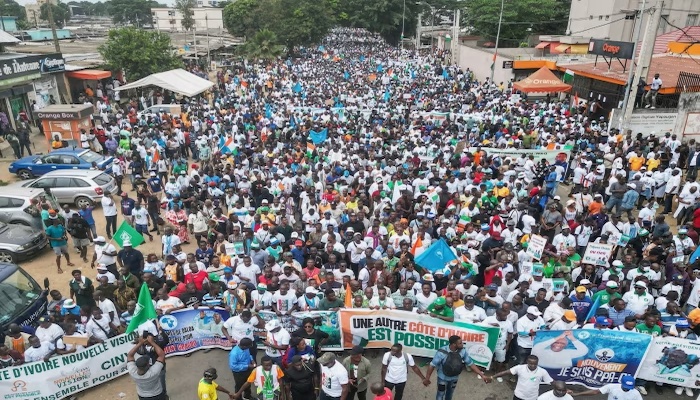Ivory Coast’s opposition parties, including that of former Credit Suisse Chief Executive, Tidjane Thiam, have launched a wave of protests after their leaders were struck from the ballot, fuelling uncertainty over the future of one of West Africa’s star economies, the Financial Times has reported.
President Alassane Ouattara, 83, announced last month that he would seek a fourth term in October’s elections, arguing that a 2016 constitutional change had reset the clock on his already 14-year tenure over the world’s largest cocoa producer.
Although candidates have until the final week of August to register, Ouattara’s path appears clear after Thiam was removed from the electoral roll in April by an Abidjan court on the grounds that he was a French citizen at the time of registration.
Another opposition figure, former President Laurent Gbagbo, remains barred from running because of a conviction linked to the country’s second civil war. His refusal to concede defeat to Ouattara in 2010 sparked fighting in which at least 3,000 people were killed and half a million displaced. Gbagbo was later tried at the International Criminal Court, the first former head of state prosecuted at The Hague — and acquitted in 2019.
Ouattara has justified his decision to run as a response to what he described as the “unprecedented security, economic and monetary” challenges facing the country of 31 million people, insisting that his experience is required to tackle persistent poverty and unemployment.
Opposition politicians struck off the roll have demanded an audit of the voters’ register to enable their participation in the polls, but the head of the electoral commission has ruled this out. With limited legal recourse, protests have become the opposition’s main strategy.
Tens of thousands of supporters of Thiam and Gbagbo rallied peacefully last weekend in a working-class suburb of Abidjan, with more demonstrations expected, including another rally by Gbagbo on Saturday.
François Conradie, lead political economist at Oxford Economics, observed: “Despite the impressive turnout over the weekend, the most likely scenario remains an easy win for Ouattara amid minor unrest.”
But given Ivory Coast’s history of electoral violence, fears of renewed conflict remain.
“We pray the 2010 situation doesn’t repeat itself,” said Kacou Lucien, an entrepreneur in Abidjan. “If there’s no peace, how can I do my business?” he asked while sipping beer and eating roasted corn.
Landry Kuyo, a political analyst at NCI, a private television channel with close ties to the government, said the opposition should unite if it hopes to defeat Ouattara and must avoid “violence and talk of a coup d’état”. He maintained that Ouattara’s candidacy is legal.
Ouattara’s bid reflects a wider regional trend, with leaders accused of using lawfare to prolong their tenure. In May, Togo’s President Faure Gnassingbé extended his two-decade rule by switching to a parliamentary system that allows him to continue as prime minister.
Analysts warn that such opportunism is contributing to democratic backsliding in a region where disillusioned citizens, frustrated by dysfunctional politics, have increasingly embraced coup leaders in countries such as Burkina Faso.
Thiam has meanwhile faced criticism for campaigning from outside the country, though his allies insist he risks arrest if he returns to Ivory Coast.
Emmanuel Addeh
The post Ivory Coast Opposition Protests Grow After Thiam, Gbagbo Barred from Election appeared first on Arise News.

